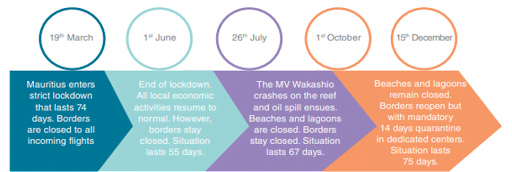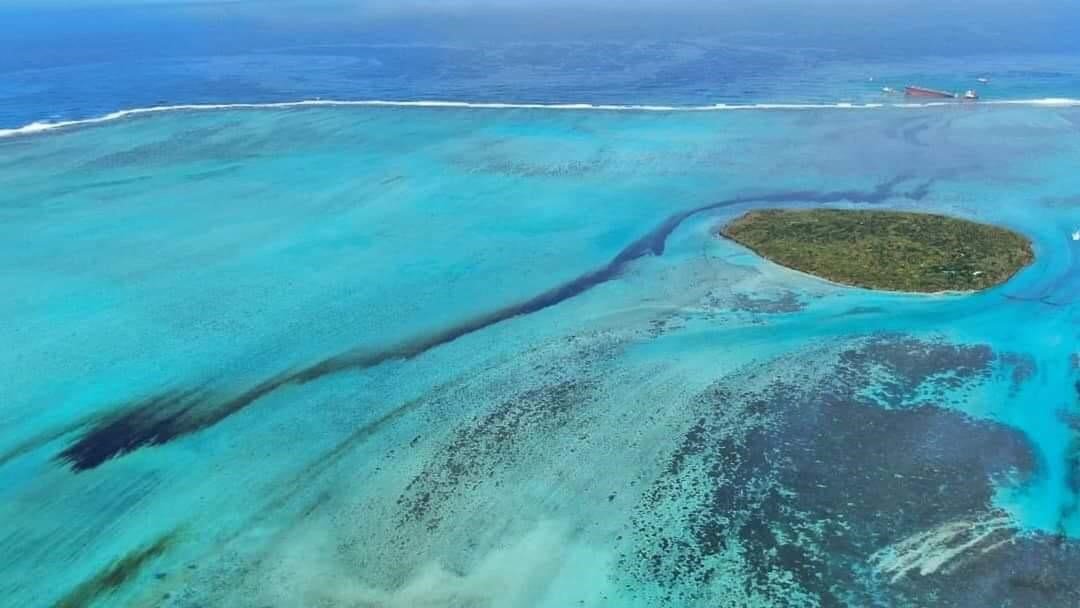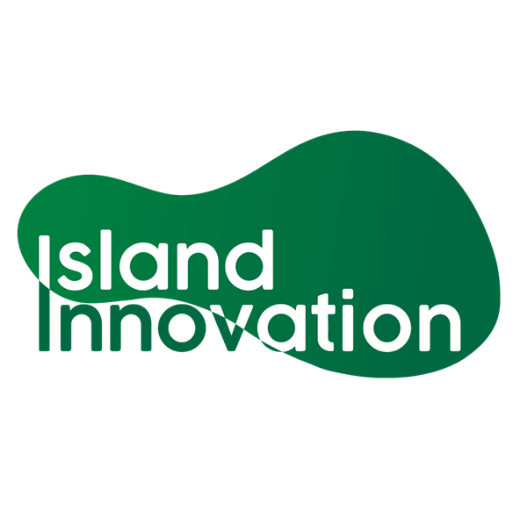Introduction:
As a small island nation and recognised biodiversity hotspot in the Indian Ocean, Mauritius is vulnerable to external socio-economic shocks and environmental stressors. In light of the climate crisis and increasingly volatile multilateral politics, Mauritius’s social, economic and environmental resilience is more important than ever. Unfortunately, two such exogenous shocks in 2020, namely the COVID-19 pandemic and the country’s worst oil spill, eroded that resilience in the South-East Coast. It is imperative that the correct measures, support mechanisms, and policies are put in place in order to repair the socio-economic losses and restore the damaged environment.
Background:
On the 25th of July 2020, the Japanese-owned, Panama-flagged MV Wakashio bulk carrier vessel, ran aground off the island’s south-east coast, spilling over 1,000 tonnes of fuel oil along more than 30 km of coastline. The region is known for its artisanal fishing villages and concentration of ecologically sensitive areas and nature reserves, including two Ramsar sites, two fishing reserves and several islets and nature reserves. This incident occurred while the island was still dealing with the COVID-19 pandemic, notably about one month after one of the world’s most severe 3-month national lockdowns.
Timeline of events:

To explore the impact of these compounding shocks on the Southeast coastal communities of Mauritius, our team undertook a study, between November 2020 and January 2021, involving seven community meetings attended by 120 community members, 22 key informant interviews and 792 random household surveys across the oil spill impacted sites and reference sites. The objective of this study and subsequent report is to provide an initial socio-economic assessment of the direct and indirect impacts of these adverse events, so that the information can be utilised by concerned stakeholders to provide a holistic response.
Our findings show that the oil spill and the pandemic disproportionately affected coastal communities of the Southeast coast, as this region’s socio-economic structure is nearly entirely reliant on the ocean as a resource and is relatively underdeveloped compared to the rest of the island. The communities’ main earnings come from tourism (hotels, bed and breakfasts, seafood restaurants, and ocean-based activities), and on fishing. Thus, the closure of the country’s borders to tourism during that period, the closure of the sea during the lockdown and again after the oil-spill essentially closed all revenue streams of this susceptible region and its communities for 10 months.
Notable impacts:
- Our results indicate that post Covid-19 lockdown there was an overall reduction in household earnings, averaging -40.5% for the reference sites and -47.5% for the spill sites. By November, whilst earnings in the reference sites had recovered to an average of -32%; earnings in the spill sites continued to decline to -56.6%.
- For fishers, our survey results from the oil spill-impacted sites indicate a 51% reduction in fishing income due to the 2020 COVID-19 lockdown, reaching a 72% reduction in fishing revenue due to the oil spill. Fishers were affected by a combination of factors: a forced unemployment period, a reduction in revenue and increase in household debt, a drastic change in their diet composition, health issues and damage to fishing equipment.
- Most people employed in the tourism sector in the spill sites did not access the domestic tourism market like those on the rest of the island. The oil spill hampered any form of recovery from COVID-19, and many small and medium bed-and-breakfasts and restaurants noted they were at risk of closing their businesses within months.
- Of the groups that are disproportionately impacted by COVID-19 and the oil spill, women were one of the hardest hit. Firstly, as the de-facto carers of children impacting their ability to continue their economic activities, secondly as the victims of a rise in domestic violence during the lockdowns, and finally as fishers/gleaners’ women are usually unregistered and therefore could not benefit from government compensation and allowances.
- Food security was an important issue that we found across all sites, with up to 80% of respondents having faced some form of food-related challenge. Many relied on less varied diets, and the generosity of friends and family, and donations.
- General coping mechanisms used to survive included using-up their savings (70%), reduced spending on non-essential items (10%), the accumulation of more debt for those that could borrow (7%), and selling off household goods or productive assets such as boats for those that could sell (3%).
- Other impacts include (but are not limited to): mental health issues, a feeling of ‘loss of the future’ and inability to switch to other trades, and social discord, especially related to perceived injustices with the distribution of help.
Current barriers to resilience:
Building back the region started nearly immediately after the oil-spill by various stakeholders such as NGOs, the private sector, the Mauritian Government, along with the support of other entities such as the Japanese Government and the UN. According to our initial assessment of these responses, a number of issues remain which continue to affect the resilience of the impacted Southeast coast of Mauritius.
The perceived lack of preparedness of the government, the slow start of the expert clean-up process and lack of information about clean-up strategies and short- & long-term monitoring have created an important trust-deficit amongst the communities, which could hamper future recovery efforts.
A lot of the difficulties faced by the communities stemmed from how beneficiaries of financial support and compensation were chosen. Although the government set-up the MV Wakashio Support Cell to identify beneficiaries using top-down and bottom-up approaches, one of the approaches employed was to distinguish COVID-19 impacts from Wakashio impacts and aim to support only Wakashio-impacted individuals. This is quite problematic as these events/disasters happened simultaneously and worsened each other’s impacts. Secondly, most beneficiaries were chosen from formal lists from respective institutions such as registered fishers and tourist operators, leaving out affected individuals in the informal sector as well as other businesses indirectly impacted such as seafood restaurants. Thirdly, fishers were compensated at a much lower rate than their usual earnings, also caused by the fact that fish catches tend to be under–reported. And a final issue, for the small percentage of those who indebted themselves, sold productive assets etc. resilience may be so eroded that the road to recovery is likely to be very complex without additional support.
Brief high-level recommendations:
- Acknowledge compounding impacts of COVID-19 and the oil spill in support packages.
- Review list of beneficiaries, based on their needs related to the oil-spill impacts rather than their ‘official status’.
- Use a gendered approach when providing assistance.
- Financial management training and increase availability of micro-credits.
- Upskilling.
- Short- and long-term environmental monitoring.
- Short- and long-term health monitoring.
- Publish scientific findings about monitoring activities and promote open evidence-based communication.
Summary written by Amandine de Rosnay, Sustainability Consultant, Dynamia
Cover photo credit: Pierre Dalais




